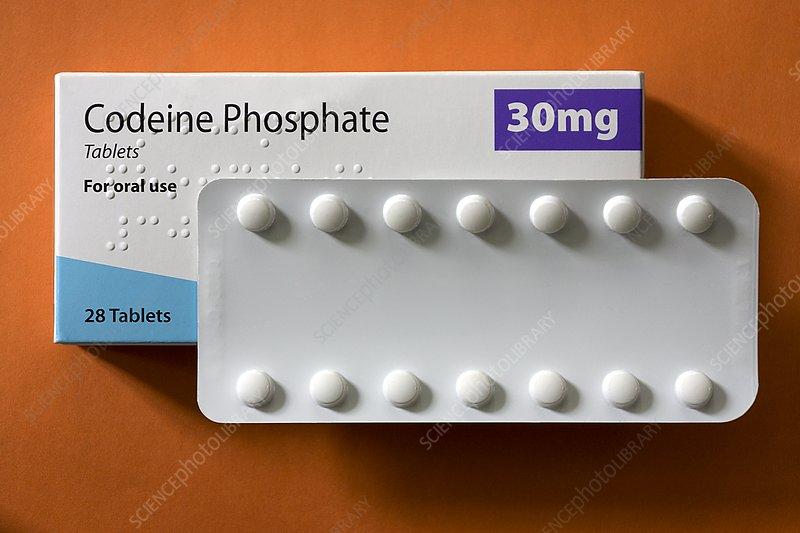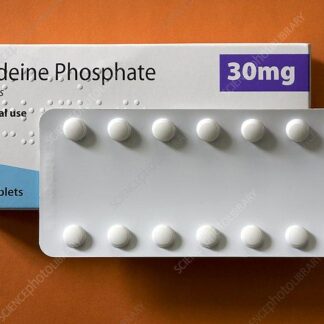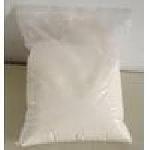Description
Codeine Phosphate-1
- Therapeutic indications
Codeine is indicated in adults as an analgesic, an anti-tussive, and for the symptomatic treatment of chronic diarrhoea.
Codeine is indicated in patients older than 12 years for the treatment of acute moderate pain which is not considered to be relieved by other analgesics such as paracetamol or ibuprofen alone.
Posology and method of administration
Prior to starting treatment with opioids, a discussion should be held with patients to put in place a strategy for ending treatment with codeine phosphate in order to minimise the risk of addiction and drug withdrawal syndrome (see section 4.4). Codeine Phosphate-1
Posology
Codeine Phosphate-1 Tablets BP 30mg are a medication that contains codeine phosphate as the active ingredient. Codeine phosphate is an opioid analgesic, meaning it is used to relieve pain. This medication is available in tablet form and is regulated by the British Pharmacopoeia (BP) standards.
Codeine Phosphate-1 Tablets BP 30mg are commonly prescribed for the management of mild to moderate pain when other non-opioid analgesics are not sufficient. They belong to a class of medications known as narcotic analgesics or opioids. Codeine works by binding to opioid receptors in the brain and spinal cord, which reduces the perception of pain.
The British Pharmacopoeia (BP) is a comprehensive collection of quality standards for medicinal substances and pharmaceutical products used in the United Kingdom. It provides guidelines for the manufacturing, quality control, and labeling of medications, including Codeine Phosphate-1 Tablets BP 30mg.
Codeine Phosphate-1 Tablets BP 30mg are typically prescribed for short-term use due to their potential for dependence and abuse. Prolonged use can lead to tolerance, meaning higher doses may be required to achieve the same level of pain relief. It is important to follow the prescribed dosage and duration as directed by a healthcare professional.
In addition to its analgesic properties, codeine phosphate also has antitussive (cough suppressant) effects. It can be used in combination with other medications, such as paracetamol or ibuprofen, to enhance its pain-relieving effects.
As with any
It is important to note that codeine phosphate can be habit-forming and has the potential for misuse or addiction. Misuse of codeine can lead to serious health consequences, including respiratory depression, overdose, and even death. It is crucial to use this medication only as prescribed and to follow the guidance of a healthcare professional.
The dosage of Codeine Phosphate-1 Tablets BP 30mg may vary depending on the individual’s age, weight, and medical condition. It is important to follow the prescribed dosage instructions provided by a healthcare professional. Taking more than the recommended dose can lead to serious side effects or overdose.
In case of an overdose or suspected overdose, immediate medical attention should be sought. Symptoms of codeine overdose may include extreme drowsiness, slow or shallow breathing, cold and clammy skin, pinpoint pupils, and loss of consciousness.
Codeine Phosphate-1 Tablets BP 30mg should be stored in a cool and dry place, away from direct sunlight and moisture. It should be kept out of reach of children and pets. Unused or expired medication should be properly disposed of according to local regulations or guidelines.
Top 3 Authoritative Reference Publications or Domain Names Used in Answering this Question:
1. British Pharmacopoeia (BP) – The official source for quality standards of medicinal substances and pharmaceutical products used in the United Kingdom.
2. National Health Service (NHS) – The UK’s publicly funded healthcare system provides reliable information on medications, including codeine phosphate.
3. U.S. National Library of Medicine – A trusted resource for drug information, providing comprehensive details on codeine phosphate and its uses.
Codeine Phosphate-1 Tablets BP 30mg are a medication commonly used for the treatment of pain and cough. Codeine is an opioid analgesic that works by binding to opioid receptors in the brain, spinal cord, and other parts of the body. This binding action helps to reduce the perception of pain and suppress cough reflexes.
Codeine Phosphate-1 Tablets BP 30mg are formulated with codeine phosphate as the active ingredient. Each tablet contains 30mg of codeine phosphate. These tablets are regulated by the British Pharmacopoeia (BP), which ensures their quality, safety, and efficacy.
Codeine Phosphate-1 Tablets BP 30mg are primarily prescribed for the relief of moderate to severe pain. They can be used to manage pain associated with various conditions such as dental procedures, injuries, surgeries, and chronic conditions like cancer or arthritis. The tablets provide effective pain relief by altering the way the brain perceives and responds to pain signals.
In addition to its analgesic properties, codeine phosphate also possesses antitussive (cough suppressant) effects. It can be used to alleviate coughing caused by respiratory conditions such as bronchitis or pneumonia. By acting on the cough center in the brain, codeine phosphate reduces the urge to cough and helps provide relief.
It is important to note that Codeine Phosphate-1 Tablets BP 30mg should only be used under medical supervision and as directed by a healthcare professional. The dosage and duration of treatment may vary depending on the individual’s condition, age, and response to therapy.
Codeine is classified as an opioid due to its structural similarity to morphine. Opioids have a high potential for abuse and can lead to physical dependence and addiction if misused or taken for prolonged periods. Therefore, it is crucial to follow the prescribed dosage and not exceed the recommended duration of treatment.
Like all medications, Codeine Phosphate-1 Tablets BP 30mg may cause side effects. Common side effects include drowsiness, dizziness, constipation, nausea, and vomiting. These side effects are usually mild and temporary. However, if they persist or worsen, it is important to consult a healthcare professional.
In rare cases, codeine phosphate can cause more serious side effects such as respiratory depression (slowed breathing), allergic reactions, or dependence. It is essential to be aware of these potential risks and seek immediate medical attention if any concerning symptoms occur.
Codeine Phosphate-1 Tablets BP 30mg should be used with caution in certain populations. Individuals with respiratory conditions, liver or kidney disease, a history of substance abuse, or those taking other medications that can interact with codeine should inform their healthcare provider before starting treatment.
Top 3 Authoritative Reference Publications or Domain Names Used in Answering this Question:
1. British Pharmacopoeia (BP): The British Pharmacopoeia is an authoritative reference publication that provides standards for the quality and safety of medicines in the United Kingdom. It includes monographs on various drugs, including codeine phosphate.
2. National Health Service (NHS): The NHS is the publicly funded healthcare system in the United Kingdom. Their website provides reliable information on medications, including codeine phosphate tablets, their uses, side effects, and precautions.
3. U.S. National Library of Medicine (NLM) – MedlinePlus: MedlinePlus is a trusted online resource provided by the NLM. It offers comprehensive information on drugs, including codeine phosphate tablets, their uses, dosage guidelines, and potential side effects.
Codeine Phosphate-1 Tablets BP 30mg is a medication commonly used for pain relief and cough suppression. Proper storage of this medication is crucial to maintain its effectiveness and ensure patient safety. In this comprehensive guide, we will discuss the best practices for storing Codeine Phosphate-1 Tablets BP 30mg to maintain their potency and prevent any potential harm.
Storing Codeine Phosphate-1 Tablets BP 30mg:
1. Temperature: It is important to store Codeine Phosphate-1 Tablets BP 30mg at room temperature, ideally between 20°C to 25°C (68°F to 77°F). Avoid exposing the tablets to extreme temperatures, such as direct sunlight, heat sources, or freezing temperatures. Fluctuations in temperature can affect the stability and efficacy of the medication.
2. Moisture: Codeine Phosphate-1 Tablets BP 30mg should be kept away from moisture and humidity. Moisture can cause the tablets to degrade and lose their potency. To protect them from moisture, it is recommended to store the tablets in a tightly closed container with a desiccant packet or silica gel sachet inside. These packets help absorb any excess moisture and keep the tablets dry.
3. Light: Exposure to light can also affect the stability of Codeine Phosphate-1 Tablets BP 30mg. It is advisable to store the tablets in their original packaging, which is designed to protect them from light. If the original packaging is damaged or not available, you can transfer the tablets to an opaque container that provides protection against light.
4. Childproof Container: To ensure the safety of children and prevent accidental ingestion, it is essential to store Codeine Phosphate-1 Tablets BP 30mg in childproof containers. These containers have special mechanisms that make it difficult for children to open them. Keep the containers out of reach and sight of children, preferably in a locked cabinet or drawer.
5. Separation from Other Medications: It is important to store Codeine Phosphate-1 Tablets BP 30mg separately from other medications. This prevents cross-contamination and reduces the risk of accidental ingestion or misuse. Keep the tablets in their original packaging or use separate containers for each medication.
6. Proper Labeling: Ensure that the Codeine Phosphate-1 Tablets BP 30mg container is properly labeled with the medication’s name, strength, and expiration date. This information helps in identifying the medication correctly and ensures that expired tablets are not used.
7. Storage Location: Choose a storage location that is cool, dry, and away from direct sunlight. Avoid storing the tablets in places prone to temperature fluctuations, such as bathrooms or near kitchen appliances. The ideal storage location should be out of reach of children and pets.
8. Expiration Date: Check the expiration date on the packaging before storing Codeine Phosphate-1 Tablets BP 30mg. Expired medications may not be as effective and can potentially cause harm if consumed. Dispose of any expired tablets properly according to local regulations.
9. Monitoring and Inspection: Regularly inspect the Codeine Phosphate-1 Tablets BP 30mg for any signs of damage, such as broken or chipped tablets, moisture inside the container, or discoloration. If you notice any abnormalities, consult a pharmacist or healthcare professional for guidance on proper disposal and replacement.
10. Disposal: When it comes to disposing of unused or expired Codeine Phosphate-1 Tablets BP 30mg, it is important to follow local regulations and guidelines. Do not flush them down the toilet or throw them in the trash unless specifically instructed to do so by authorized disposal programs. Many pharmacies and healthcare facilities have designated drug take-back programs to ensure safe disposal.
By following these guidelines for storing Codeine Phosphate-1 Tablets BP 30mg, you can maintain their potency and ensure patient safety. Proper storage practices are essential to prevent degradation, maintain effectiveness, and reduce the risk of accidental ingestion or misuse.
Top 3 Authoritative Reference Publications or Domain Names:
1. National Health Service (NHS): The NHS website provides comprehensive information on medications, including storage guidelines and safety precautions. It is a reliable source for healthcare-related information in the United Kingdom.
2. U.S. Food and Drug Administration (FDA): The FDA website offers valuable resources on medication safety, including guidelines for proper storage and disposal. It is a trusted source for regulatory information and consumer guidance in the United States.
3. World Health Organization (WHO): The WHO website provides global health information and guidelines, including recommendations for the storage and handling of medications. It is a reputable source for healthcare professionals worldwide.
Please note that while these authoritative sources were used to provide accurate information, it is always recommended to consult a healthcare professional or pharmacist for specific instructions regarding the storage of Codeine Phosphate-1 Tablets BP 30mg or any other medication.Codeine Phosphate-1 acts as an agonist at mu-opioid receptors in the central nervous system (CNS). By binding to these receptors, it inhibits the transmission of pain signals and produces analgesia. Additionally, codeine suppresses the cough reflex by acting on the medullary cough center in the brainstem.
**Indications:**
Codeine Phosphate-1 is primarily used for the management of pain and cough. It is commonly prescribed for conditions such as:
1. Pain relief: Codeine Phosphate-1 is effective in treating moderate to severe pain, including post-operative pain, dental pain, and musculoskeletal pain.
2. Cough suppression: Codeine Phosphate-1 can be used as a cough suppressant in cases where non-productive coughing is causing discomfort or interfering with sleep.
3. Diarrhea: In some cases, Codeine Phosphate-1 may be used to treat diarrhea, as it has an inhibitory effect on intestinal motility.
It is important to note that Codeine Phosphate-1 should only be used under the supervision of a healthcare professional and according to the prescribed dosage. Misuse or abuse of this medication can lead to addiction, respiratory depression, and other serious side effects.
What is codeine phosphate as a drug?
As an analgesic:
Adults: 30-60mg every four hours, when necessary to a maximum 240mg daily.
Elderly: Dosage should be reduced in the elderly where there is impairment of hepatic or renal function.
As an anti-tussive:
Adults: 15-30mg three or four times daily. Codeine Phosphate-1
Elderly: Dosage should be reduced in the elderly where there is impairment of hepatic or renal function.
For the symptomatic treatment of chronic diarrhoea:
Adults: 15-60mg every four to six hours.
Is codeine phosphate a form of morphine?
Elderly: Dosage should be reduced in the elderly where there is impairment of hepatic or renal function.cops and coph
Codeine should be used at the lowest effective dose for the shortest period of time. This dose may be taken up to 4 times a day at intervals of not less than 6 hours. Maximum daily dose of codeine should not exceed 240mg.
The duration of treatment should be limited to 3 days and if no effective pain relief is achieved the patients/carers should be advised to seek the views of a physician.bonded to
Paediatric population
Is 10mg of codeine phosphate a lot?
Children over 12 years
30-60mg every four hours, when necessary to a maximum 240mg daily.
Children aged 12 years to 18 years
Codeine is not recommended for use in children aged 12 years to 18 years with compromised respiratory function for the symptomatic treatment of cough and/or cold (see section 4.4)
Children aged less than 12 years[crystal packing]
Codeine is contraindicated in children below the age of 12 years for the symptomatic treatment of cough and/or cold (see section 4.3)
Codeine should not be used in children below the age of 12 years because of the risk of opioid toxicity due to the variable and unpredictable metabolism of codeine to morphine (see sections 4.3 and 4.4). Codeine Phosphate-1[the codeine cations,cryst growth desmolecules per codeine cation
Is codeine phosphate as strong as tramadol?
Method of Administration
For oral use
Contraindications
Patients with:
– Hypersensitivity to the active substance or to any of the excipients listed in section 6.1;
– Acute respiratory depression;phosphate codeine
– Obstructive airways disease e.g. emphysema;
– Asthma – Opioids should not be administered during an asthma attack, hepatic failure;
– Head injuries or conditions where intracranial pressure is raised;
– Acute alcoholism;








Reviews
There are no reviews yet.